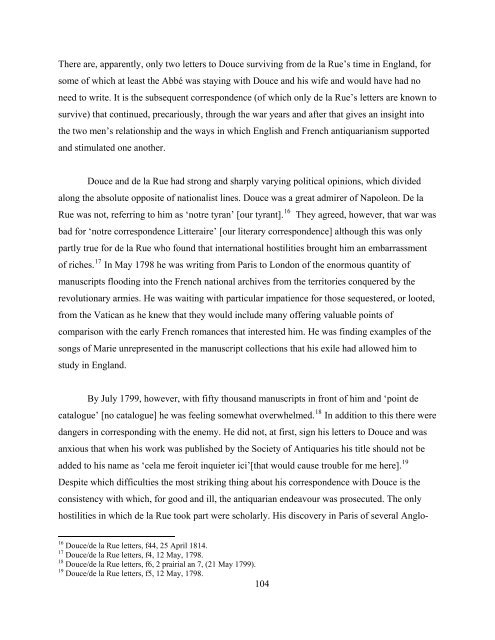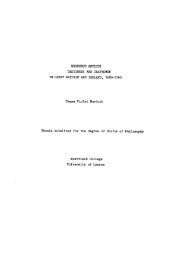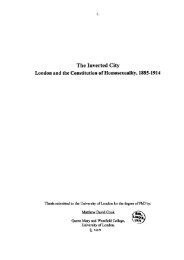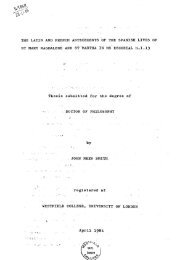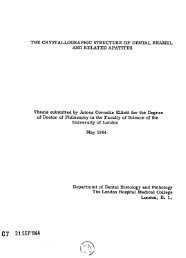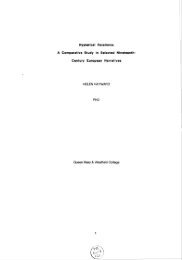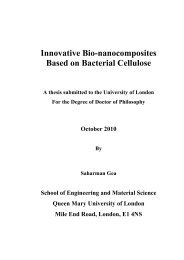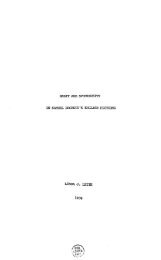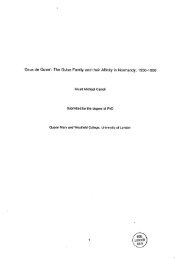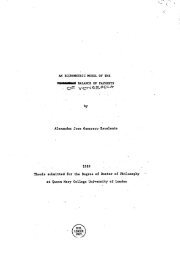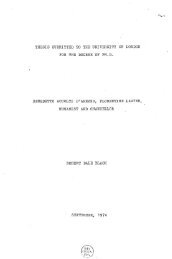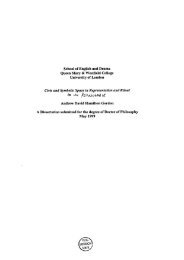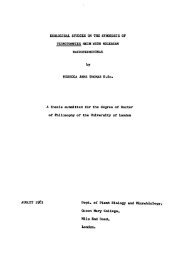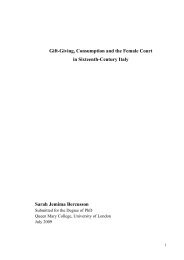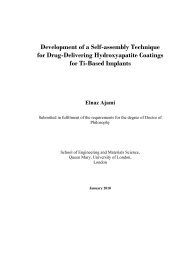Antiquaries in the Age of Romanticism: 1789-1851 - Queen Mary ...
Antiquaries in the Age of Romanticism: 1789-1851 - Queen Mary ...
Antiquaries in the Age of Romanticism: 1789-1851 - Queen Mary ...
You also want an ePaper? Increase the reach of your titles
YUMPU automatically turns print PDFs into web optimized ePapers that Google loves.
There are, apparently, only two letters to Douce surviv<strong>in</strong>g from de la Rue’s time <strong>in</strong> England, for<br />
some <strong>of</strong> which at least <strong>the</strong> Abbé was stay<strong>in</strong>g with Douce and his wife and would have had no<br />
need to write. It is <strong>the</strong> subsequent correspondence (<strong>of</strong> which only de la Rue’s letters are known to<br />
survive) that cont<strong>in</strong>ued, precariously, through <strong>the</strong> war years and after that gives an <strong>in</strong>sight <strong>in</strong>to<br />
<strong>the</strong> two men’s relationship and <strong>the</strong> ways <strong>in</strong> which English and French antiquarianism supported<br />
and stimulated one ano<strong>the</strong>r.<br />
Douce and de la Rue had strong and sharply vary<strong>in</strong>g political op<strong>in</strong>ions, which divided<br />
along <strong>the</strong> absolute opposite <strong>of</strong> nationalist l<strong>in</strong>es. Douce was a great admirer <strong>of</strong> Napoleon. De la<br />
Rue was not, referr<strong>in</strong>g to him as ‘notre tyran’ [our tyrant]. 16 They agreed, however, that war was<br />
bad for ‘notre correspondence Litteraire’ [our literary correspondence] although this was only<br />
partly true for de la Rue who found that <strong>in</strong>ternational hostilities brought him an embarrassment<br />
<strong>of</strong> riches. 17 In May 1798 he was writ<strong>in</strong>g from Paris to London <strong>of</strong> <strong>the</strong> enormous quantity <strong>of</strong><br />
manuscripts flood<strong>in</strong>g <strong>in</strong>to <strong>the</strong> French national archives from <strong>the</strong> territories conquered by <strong>the</strong><br />
revolutionary armies. He was wait<strong>in</strong>g with particular impatience for those sequestered, or looted,<br />
from <strong>the</strong> Vatican as he knew that <strong>the</strong>y would <strong>in</strong>clude many <strong>of</strong>fer<strong>in</strong>g valuable po<strong>in</strong>ts <strong>of</strong><br />
comparison with <strong>the</strong> early French romances that <strong>in</strong>terested him. He was f<strong>in</strong>d<strong>in</strong>g examples <strong>of</strong> <strong>the</strong><br />
songs <strong>of</strong> Marie unrepresented <strong>in</strong> <strong>the</strong> manuscript collections that his exile had allowed him to<br />
study <strong>in</strong> England.<br />
By July 1799, however, with fifty thousand manuscripts <strong>in</strong> front <strong>of</strong> him and ‘po<strong>in</strong>t de<br />
catalogue’ [no catalogue] he was feel<strong>in</strong>g somewhat overwhelmed. 18 In addition to this <strong>the</strong>re were<br />
dangers <strong>in</strong> correspond<strong>in</strong>g with <strong>the</strong> enemy. He did not, at first, sign his letters to Douce and was<br />
anxious that when his work was published by <strong>the</strong> Society <strong>of</strong> <strong>Antiquaries</strong> his title should not be<br />
added to his name as ‘cela me feroit <strong>in</strong>quieter ici’[that would cause trouble for me here]. 19<br />
Despite which difficulties <strong>the</strong> most strik<strong>in</strong>g th<strong>in</strong>g about his correspondence with Douce is <strong>the</strong><br />
consistency with which, for good and ill, <strong>the</strong> antiquarian endeavour was prosecuted. The only<br />
hostilities <strong>in</strong> which de la Rue took part were scholarly. His discovery <strong>in</strong> Paris <strong>of</strong> several Anglo-<br />
16<br />
Douce/de la Rue letters, f44, 25 April 1814.<br />
17<br />
Douce/de la Rue letters, f4, 12 May, 1798.<br />
18<br />
Douce/de la Rue letters, f6, 2 prairial an 7, (21 May 1799).<br />
19<br />
Douce/de la Rue letters, f5, 12 May, 1798.<br />
104


